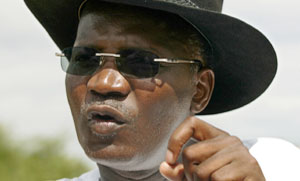PSMAS board slashes Cuthbert Dube’s salary

 Harare Bureau
Harare Bureau
THE Premier Service Medical Aid Society board has slashed the salaries of chief executive officer Cuthbert Dube and senior management at the firm.Since September 2012, Dube had been taking home $230,000 monthly as his basic pay, while remuneration for 13 other executives ranged from $15,000 for the CEO’s personal assistant, to $200,000.
Board members would last night not say how much Dube would take home effective January 2014, but sources indicated it would be within the range of that of the highest-paid CEO in Zimbabwe’s private sector, a figure believed to be between $50,000 and $60,000.
This would mean he now gets roughly a quarter of what he earned between September and December 2013, but is still the highest paid job in a government-linked enterprise.
Another source said this salary would also be slashed when government completes its re-alignment of packages of bosses at parastatals and State-owned enterprises.
In a statement soon after last night’s board meeting, deputy chair Newton Mhlanga said they had taken the decision in December 2013.
The board met yesterday to review operations at PSMAS and respond to articles by the media this week on the firm’s debts and its salary structure.
“The board caused an immediate review of the remuneration of top management in line with market trends. The board commissioned an independent salary survey to guide its deliberations and communicated its position to government through the Ministry of Finance.
“The process was concluded on December 24, 2013 and the resolution on the new reduced salaries and benefits took effect on January 1, 2014,” the statement read.
Mhlanga declined to take questions and would not say what the new salary structure of PSMAS’ top 14 is. Previously, the top 14 gobbled nearly $1,1 million of the total wage bill of $2 million.
He said they took note of a weakness in the society’s remuneration practice, founded on a long-established culture from PSMAS’ inception in the colonial days, where the CEO’s package was solely determined by the board chair.
“The board, through its benefits committee is finalising the review and realignment of board fees and related benefits in line with market trends.
“The board made a decision to review its operating procedures and align these to best practice in corporate governance,” read the statement.
Mhlanga said the board also decided that specialists like medical doctors working for PSMAS should be competitively rewarded ahead of general administrative staff.
“The board has already commissioned a restructuring exercise of the entire organisation which process should complete (sic) by end of January 31.”
PSMAS has a membership of 794,000 people, mostly civil servants and the uniformed services. As at December 31, 2013, the society owed service providers $38 million in unpaid bills.
Dube earned $144, 097,52 in June 2012, and it rose to $230, 000 by September 2013. This means his basic salary went up nearly $100, 000 in three months.
The PSMAS annual wage bill rose from $15,547,171 in 2011 to $33,413,373 in 2012, almost half of which was paid to the top 14 managers.
After Dube, the next two top earners were the group finance manager, an E Gwinyai (no longer with PSMAS), who earned a basic salary of $200,000 a month, and group operations executive Enock Chitekedza ($122,000).
Eight other senior directors were earning a basic salary of $60,000 every month. Two middle managers were paid $30,000 and $22,000 each, while Dube’s PA, Florence Tsiga, took home $15,000 monthly.
While the top 14 earned nearly $1,1 million monthly, while everyone else at PSMAS earned a combined $900,000. Further, all group executives recently received a $300,000 payment, approved by Dube, for as yet unclear reasons.
Minutes of a meeting on July 4, 2012 show that Dube approved lump sum payments of $300, 000 for each group executive.
Documents in our possession also show that PSMAS bought a house in Glen Lorne, Harare, for about $534,000 for Dube.
It is not clear if the purchase was a loan advanced to Dube or was part of his package as group CEO. Meanwhile, government has ordered PSMAS to furnish it with details of its salary structure amid calls by legislators for the suspension of the management.
Health and Child Care Minister David Parirenyatwa said they were urgently dealing with the “shocking” salaries being paid to managers at PSMAS.
Parirenyatwa was responding to Senators questions in the Upper House yesterday. Manicaland Senator Patrick Chitaka (MDC-T) had asked if reports that Dube was earning $230,000 were true and such salaries were sustainable.
“We have already invited them to give us information to discuss this issue. We are not only looking at salaries but we are looking at what you are contributing as an individual and what they are paying to hospitals and service providers. So we are deeply investigating to make sure that as a population, we are not compromised,” said Parirenyatwa.
“We will look at the law and statutes and see whether they satisfy the various requirements that are stipulated in the law. We do not want to say “yes” in terms of salaries that we have not yet confirmed.”
PSMAS, said Parirenyatwa, was jointly managed by his ministry, and the Public Service, Labour and Social Welfare and Finance ministries.
Mashonaland West Senator Prisca Mupfumira (Zanu-PF) wanted to know if government would suspend the Dube-led executive pending investigations, saying chances were that evidence might be suppressed should investigations be done while they were in office.
“We know that the law of the country stipulates that everyone is presumed innocent until proven guilty. Why don’t you do as what happened at ZBC where the CEO was suspended to facilitate investigations because honestly how can you carry out investigations when one is in office?” she said. “We are urgently looking at what you have said,” responded Parirenyatwa.
Chiefs Council president Fortune Charumbira asked if government was dealing with the “obscene” salary structures in parastatals and State-owned entities.
“It is like they are in a different economy (from) others,” he said.
Parirenyatwa responded: “I share with you your sentiments. If we compare the salaries it means you can all be paid by one person here.”









Comments